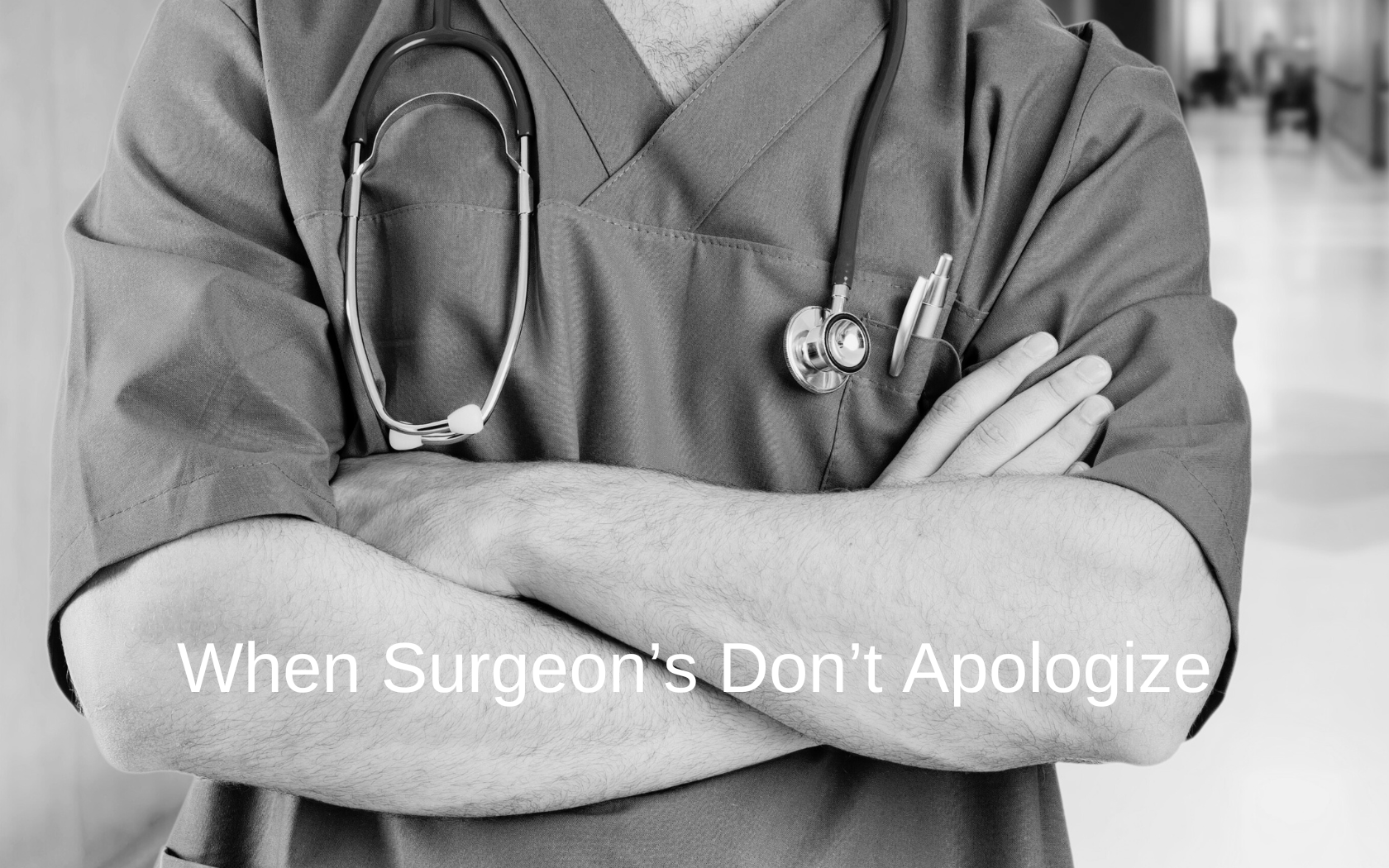“I’m sorry.” Those two words, when said sincerely, mean the world to patients whose lives have been turned upside down by surgical malpractice. But they’re seldom heard in hospitals. Rather, many surgeons and hospitals tend to take the approach of denying wrongdoing at all costs. But denying any liability can actually cost them more. Stay with us to find out why.

What Constitutes Surgical Malpractice?
Surgery is dangerous. No one needs convincing of that—it involves opening and manipulating the fragile interior of the body, after all. Surgeons have the obligation to let their patients know what the risks are before they agree to an operation.
Sometimes patients experience unexpected complications, even despite the surgeon’s best efforts. But if a surgeon veers outside the standard of care during surgery and injures the patient, it’s surgical malpractice.
Examples of surgical malpractice include:
- Performing surgery on the wrong body part
- Operating on the wrong patient
- Leaving surgical instruments, sponges, or other foreign objects inside the patient’s body after surgery
- Administering too much or too little anesthesia
- Inadequate infection control
- Accidentally injuring nerves during surgery
- Injuring adjacent organs or tissues during surgery
- Failing to provide proper postoperative care
- Failing to get informed consent from the patient
- Not performing essential preoperative assessments, like making sure the patient is in suitable condition for surgery

What Do Surgeons Say When They Mess Up?
As it turns out, only a little more than half of surgeons say “sorry” when they mess up. That’s the awful truth that one survey from the Centre for Healthcare Organization and Implementation Research uncovered.
“Sorry” won’t undo an injury. But not saying sorry can make things worse. Research shows that people are more likely to accept a settlement when it comes with an apology. Otherwise, they might consider taking the guilty party to court and suing them for all they’re worth.
In fact, most of the time injured patients or their families don’t want to sue at all. It’s not an easy process. Dealing with the aftermath of a serious injury is difficult enough, without having to deal with the legal process.
So if there’s one main reason why people are driven to file surgical malpractice lawsuits, it’s because they’re kept in the dark. They feel deceived, angry, and betrayed. But instead of apologizing, the doctors who pledged to “do them no harm” are busy covering up their tracks.
Apologies and Legal Liability
Why do many surgeons avoid saying “sorry”? Is it because they believe admitting fault could make it easier for a patient to sue them?
You may have heard that doctors should avoid making any statements that could be interpreted as “admissions of legal liability”. But the reality is that 36 states have laws that prevent apologies from being used against doctors in court. So there’s no reason why doctors shouldn’t say, “I’m sorry.”
In fact, hospitals often avoid enormous costs when they apologize for an error. People who receive an apology are much more likely to accept a settlement. Take for example Leilani Schweitzer, who lost her son because of a medical error when he was only 20 months old. But Lucile Packard Children’s Hospital didn’t try to cover up the mistake. Instead, the hospital apologized right away and offered a monetary settlement and support. Those in charge took steps to prevent that error from ever happening again.

What Should Surgeons Say When They Mess Up?
As Leilani Schweitzer put it, the number one thing people who have experienced medical errors seek isn’t money. It’s a full apology. They want honesty, transparency, and answers.
So what should surgeons say when they mess up? Well, they should handle the situation with professionalism, transparency, and a strong commitment to the patient’s well-being.
Here’s what guidelines for surgeons dictate they should do if they commit an error:
- Recognize their mistakes as soon as possible.
- Inform the patient about mistakes.
- Apologize for their errors.
- Correct the mistakes with appropriate intervention or additional surgery.
- Document and report errors in accordance with local laws.
- Offer support and counseling to the family.
Openness and honesty can help heal our flawed medical system. It can help identify vulnerabilities and prevent more mistakes from happening.
But sometimes surgeons aren’t honest, either because of fear, arrogance, or pressure from their superiors. If you’re a victim of medical malpractice, know that you have somewhere to turn when hospitals and doctors fail you. As leaders in obtaining surgical malpractice settlements, we’re your best ally to getting the answers you want, and the compensation you need. Contact us now for a free consultation.




